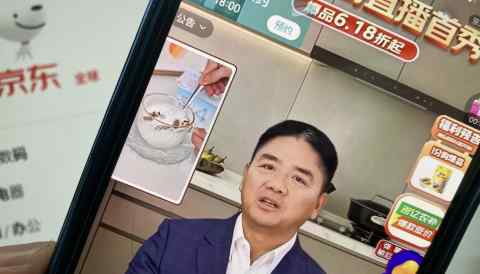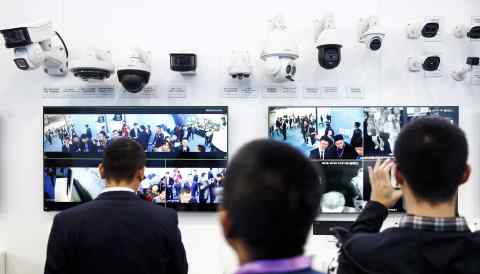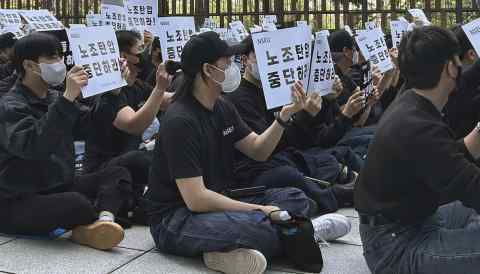
Hi everyone! This is Lauly from Taipei, still recovering from the mental shock of the biggest earthquake to hit Taiwan since 1999.
The tech supply chain on the island, which includes everything from chips and printed circuit boards to displays and final product assembly, was definitely more resilient than I was -- most operations were back to normal in less than 48 hours.
The earthquake isn't the only shock I've had lately. Last week I had lunch with a longtime source who works at a production equipment maker. The main reason we were meeting up was because the source had just been laid off, collateral damage, they said, from Apple's decision to scrap a yearslong project to develop microLED displays.
Apple has invested at least $1 billion in microLED R&D and even made a push into the actual manufacturing of the cutting-edge display technology. Sources told me that the project was canceled because production yield was far from satisfactory, adding that this affected several suppliers that had invested heavily over the past several years.
"My company spent some 15 to 20 minutes and used three slides to tell us that they are closing the entire department related to displays. Hundreds of people are affected," the source told me over lunch.
Another shock was that incoming Taiwanese president William Lai Ching-te had apparently wanted T.H. Tung, chairman of key iPhone assembler Pegatron, to be his premier.
Local media and several of my industry sources said the chairman was Lai's first choice and he almost took the offer before eventually turning it down for family reasons. Lai, who takes office next month, announced last week that Cho Jung-tai, the former chairman of the China-skeptic Democratic Progressive Party, will be premier.
This was not Lai's only brush with Taiwan's tech sector. As vice president, he has spent the last couple of years expanding his ties in the industry, even convening a "book club" to discuss matters related to the business, often with executives from key players taking part.
It seems these efforts have borne fruit. Lai has invited J.W. Kuo, chairman of Topco Group, a TSMC supplier, and Paul Liu, former chairman of PricewaterhouseCoopers Business Consulting Services Taiwan, to serve as economics minister and national development council minister, respectively.
New phone, new name
Twelve years to the day after Huawei unveiled its P series of flagship smartphones, the beleaguered Chinese tech titan began selling its latest phone, the revamped and renamed Pura 70 series.
The device marks the latest chapter in the company's comeback in the domestic smartphone market, write Nikkei Asia's Cheng Ting-Fang and Lauly Li.
The Pura 70 Ultra and Pura 70 Pro run on Huawei's in-house operating system, HarmonyOS, and are the first Huawei smartphones to incorporate a large language model, the company's Pangu LLM.
There was no official launch event -- as with its previous release, of the Mate 60 Pro last August -- though the company did release promotional videos before sales started on Thursday.
The highest-end Pura 70 Ultra starts at 9,999 yuan ($1,380), and analysts say the release could add pressure on Apple in the hotly competitive Chinese market.
Green light for G42
In its latest move to get ahead in the artificial intelligence race, Microsoft has invested $1.5 billion in Abu Dhabi AI group G42 after months of negotiation with U.S. officials to get the deal over the line, writes the Financial Times' Chloe Cornish.
The companies said they coordinated closely with governments of both the U.S. and United Arab Emirates, which has vaulting AI ambitions, spearheaded by powerful Emirati royal Sheikh Tahnoon bin Zayed al-Nahyan, who is G42's chair and oversees a sprawling business empire.
AI is a sensitive topic for the U.S., which fears Chinese competition and potential industrial espionage, and G42 had been subject to special scrutiny by U.S. politicians. The deal came through after G42 said it would be cutting out Chinese hardware and divesting from Chinese companies.
Seattle-based Microsoft will take a minority stake in G42 and gain a board seat, while G42 has pledged to use Microsoft's cloud computing platform Azure for delivering AI services.
Homemade chips
Malaysia has been revitalizing its semiconductor cluster in recent years, driven by the global trend of countries moving to beef up their supply chains after unprecedented chip shortages and ongoing geopolitical uncertainties.
Oppstar, a Malaysian chip design company, was the first company of its kind to list on the Malaysian stock exchange last year, and it received warm welcome from investors despite globally weak public listing activity, writes Nikkei Asia's Tsubasa Suruga. It was oversubscribed by 77 times, pushing its stock price up 286% on its first trading day.
Oppstar's listing symbolizes the country's ambitions to revitalize its chip industry. But the fact that it is the only chip design company listed on the Kuala Lumpur stock exchange is also a sign of how far the country -- once known as the "Silicon Valley of the East" -- still has to go if it is to return to its former tech glory.
A whole new Liu
You might have already seen digital avatars of influencers selling goods on live-streaming sites thanks to the boom in generative AI. But you might have missed one unexpected sales host: Richard Liu, founder of Chinese online retailer JD.com.
JD unveiled the digital Liu as a live sales host as the company fights for market share in live commerce, a thriving sector that the company has been struggling with, writes Nikkei Asia's Cissy Zhou.
Dressed in a dark suit, Liu's avatar promoted food and home appliances, and distributed digital coupons. The stream attracted more than 20 million viewers in less than an hour, according to JD, though the company did not reveal the number of transactions during the period.
China's live commerce industry experienced explosive growth at a time when most physical industries faced major challenges from China's stringent COVID restrictions. As a share of the total online retail market, live commerce's share surged from 14% in 2021 to 23% in 2023. The share of traditional e-commerce fell from 83% to 73% during the same period, according to data from Chinese big data company Syntun.
Suggested reads
1. Apple loses smartphone crown to Samsung as Chinese rivals gain ground (FT)
2. TSMC says global tech recovery 'not fast enough' despite AI boom (Nikkei Asia)
3. Samsung boosts Joe Biden's chipmaking ambitions with Texas plant upgrade (FT)
4. Why chipmakers are investing billions into 'advanced packaging' (FT)
5. Sanctioned Chinese security camera maker Dahua divests from U.S. (Nikkei Asia)
6. Thousands of Samsung employees rally for better working conditions (Nikkei Asia)
7. Fine porcelain maker Maruwa becomes the hottest bet for cooling AI data centres (FT)
8. Key iPhone assembler Foxconn introduces rotating CEO role (Nikkei Asia)
9. US says China is supplying missile and drone engines to Russia (FT)
10. Apple to 'look at' Indonesia manufacturing, Tim Cook tells Jokowi (Nikkei Asia)
For more great stories like this delivered to your inbox every week, sign up to our #techAsia newsletter. Current subscribers, click here to update your newsletters preferences.


.jpg?width=240&height=137&fit=cover&gravity=faces&dpr=2&quality=medium&source=nar-cms)






.jpg?width=240&height=137&fit=cover&gravity=faces&dpr=2&quality=medium&source=nar-cms)

